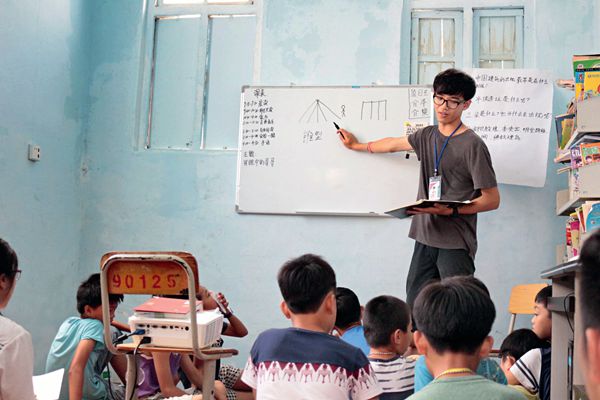Zhuzhu and Her Village Library
China Today, January 24, 2017 Adjust font size:
Lanbiao has a population of 30,000 or more. Almost all families there have multiple children – people of Zhuzhu’s age normally have between three and seven siblings – and people don’t really place much importance on their children’s education. Statistics show that just over half of those who complete junior high school choose to further their study, while the other half decide to migrate away to seek employment in big cities. The ones who stay in the village and attend school are normally left behind by their parents working out of town.

A volunteer gives a lecture on ancient architecture.
Zhuzhu was one of the dropouts. In 2003, before graduating from junior high school she left the village and started working for a living. This was considered quite normal in certain rural areas of Guangdong. “Back then, my parents, like others, thought it was enough for girls just to know some basic Chinese characters in order to avoid being deceived and to enable us to read traffic instructions,” recalled Zhuzhu.
She had a lot of jobs – a labor in a plastics plant, salesgirl in boutiques and clothes shops in the city of Dongguan, and a waitress in the city of Guangzhou. Her experience as a migrant worker broadened her horizons but also puzzled her.
In 2009, Zhuzhu heard about a non-profit agency established by migrant workers in Beijing that provides skills training and assistance for fellow migrant workers from the countryside. Determined to get involved, she volunteered at the agency and then, six months later, received skills training. After completing her training, she stayed on, helping to provide assistance and advice to the children of migrant workers and manage the affairs of a women’s cooperative.
“This experience had a great influence on me. Before going there, I had little self-confidence, but during my time there, it occurred to me that migrant workers from the countryside could do so many things in the cities. I was inspired,” said Zhuzhu.
Shortly after she went back home, Zhuzhu volunteered at Lanbiao School. She shared her training experiences with kids there and also gave sex education classes. “During the sex education classes, some students lowered their heads and others tittered with embarrassment,” Zhuzhu remembers. “Some kids stopped calling me ‘Sister’ and replaced it with ‘Miss Gross.’ Some even told me to my face how crazy it was to publicly discuss sex in the classroom; but there were also several senior high students who came to our class to listen.”
Zhuzhu’s candidness made children want to be friends with her. Children would go to her whenever they had quarrels with their parents, dropped out of school or had relationship problems. She found out that local kids were smart and outgoing, but had nothing to do in their leisure time. Normally they watched TV at home or went to video game arcades. Those from better-off families would usually get addicted to cellphone games.
This knowledge promoted Zhuzhu to set up a free library in the village.